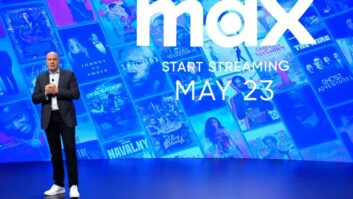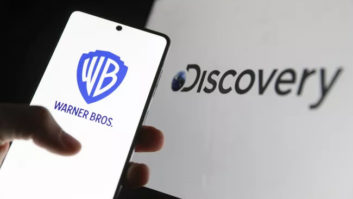According to reports, Warner Bros Discovery CEO David Zaslav has held talks with Paramount CEO Bob Bakish about a possible merger between the two companies.
Zaslav met with Bakish on Tuesday at Paramount’s headquarters in New York, according to Axios. The meeting is said to have lasted several hours.
The WBD CEO is also believed to have spoken to with Shari Redstone, who controls Paramount through her family holding company, National Amusements.
However, WBD would not be able to acquire Paramount until April because of a trust it set up to reduce taxes when Discovery acquired WarnerMedia from AT&T.
It’s thought Zaslav decided to hold talks following rumours Redstone has met with Skydance Media, which is interested in acquiring her stake in Paramount.
Richard Cooper, research director at Ampere Analysis tells TVBEurope the merger would need to be approved by regulators in the United States, but following the original merger of Warner Bros and Discovery, “it would not be unreasonable to expect this deal to also be approved”.
“Though it would reduce the number of major US studios a key consideration is the emergence of other major domestic content producers to consider such as Netflix and Amazon Prime,” Cooper adds.
For Paramount, a major benefit for a merger would be to give more of a push into the direct-to-consumer market. “Paramount was somewhat late to enter the market,” states Cooper, “as a result, even in its domestic US market Paramount+ is now one of the second-tier contenders compared to its direct rivals Disney+ and Max.
“The service has struggled to launch independently in most other territories instead, opting to partner with other US or major local players. Merging with Warner Bros Discovery is a reasonable option and would make the resulting content and streaming offer far more compelling and more of a ready rival to the likes of Disney+ and Netflix.”
Should a deal take place, Cooper believes it would make sense for the post-merger entity to retain some of Paramount’s best-known brands, such as Nickelodeon. “Channel 5 in the UK falls into this bracket and would likely be retained and benefit from the increased catalogue of content available as a result of the merger,” he adds.
Asked whether this could be a continuation of the mega deals the industry has already seen with the acquisition of 20th Century Fox by Disney, and the merger of Warner Bros and Discovery, Cooper states at this point, it’s difficult to say whether there will be more. “The other US studios, NBC Universal and Sony, are in a slightly different situation from that of Paramount with different and alternative revenue streams available to them.
“Ampere Analysis’ own reports on the pending profitability of the studio-backed streaming services would suggest we don’t really need to wait more than 6-18 for their direct-to-consumer services to turn profits reducing the need for mergers such as this.”







